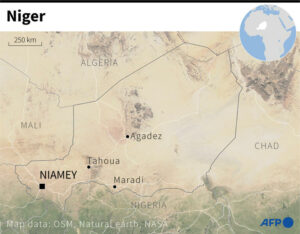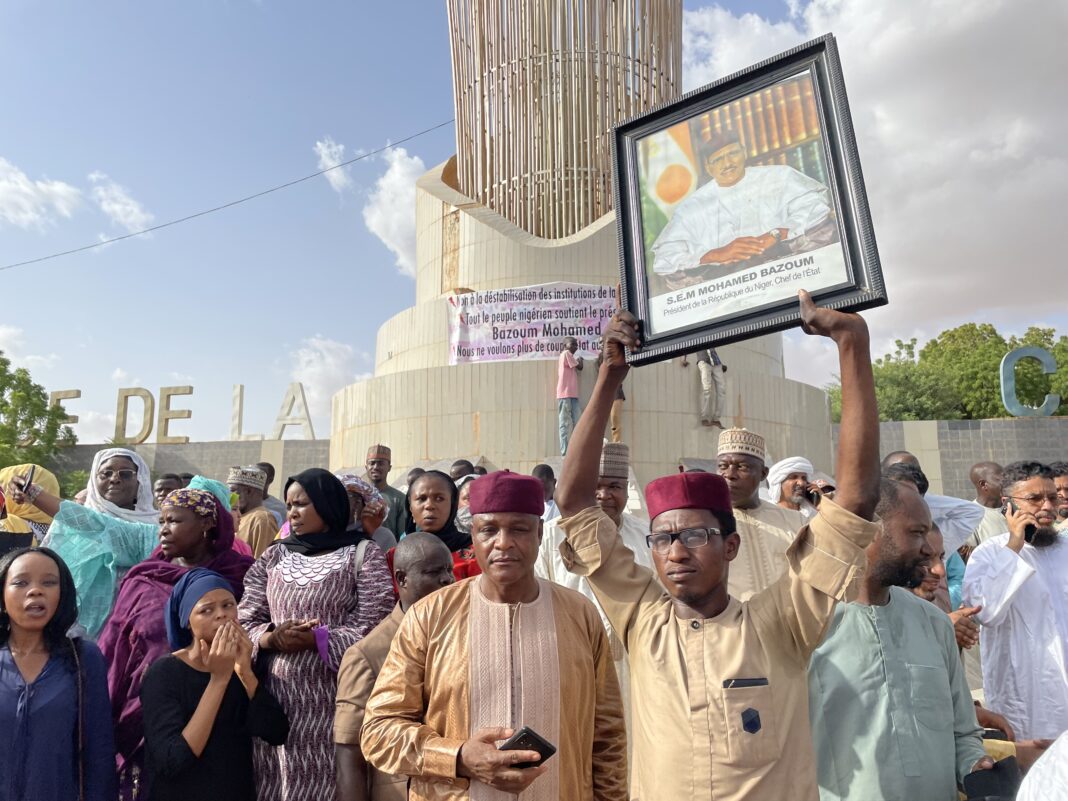Niger’s President Mohamed Bazoum on Thursday defiantly vowed to protect “hard-won” democratic gains after elite troops detained him and declared they had taken power.
In the latest turbulence to shake the troubled Sahel, Bazoum was confined on Wednesday by members of his presidential guard, who hours later announced that “all institutions” in the country would be suspended, the borders closed and a night-time curfew imposed.
As African and international organisations condemned the declared takeover and allies France and the United States voiced their support, Bazoum stood his ground.

“The hard-won gains will be safeguarded,” he said on Twitter, which is being rebranded as X. “All Nigeriens who love democracy and freedom would want this”.
Foreign Minister Hassoumi Massoudou said Niger’s “legal and legitimate power” was the one exercised by its elected president.
He told the France24 TV channel that Bazoum was “in good health”.
There had been a “coup bid” but “the whole of the army was not involved,” he stressed.
“We ask all the fractious soldiers to return to their ranks,” he said. “Everything can be achieved through dialogue but the institutions of the republic must function.”
The president of neighbouring Benin, Patrice Talon, was expected in Niamey on Thursday for mediation efforts, the head of the Economic Community of West African States (ECOWAS) said.
The streets of the capital were virtually deserted in the morning after heavy rain, an AFP journalist said.
– Coup-prone –
The landlocked state is one of the poorest and most unstable countries in the world, experiencing four coups since gaining independence from France in 1960, as well as numerous other attempts — including two previously against Bazoum.
The 63-year-old is one of a dwindling group of elected presidents and pro-Western leaders in the Sahel, where since 2020 a rampaging jihadist insurgency has triggered coups in Mali and Burkina Faso.
Their juntas have forced out French troops and in the case of Mali, the ruling military have woven a close alliance with Russia.
Disgruntled members of the Presidential Guard sealed off access to Bazoum’s residence and offices on Wednesday morning, and after talks broke down “refused to release the president,” a presidential source said.
Bazoum supporters hours later tried to approach the official complex, but were dispersed by members of the Presidential Guard who fired warning shots, an AFP reporter saw. One person was hurt, but the cause was unclear.
The coup leaders appeared on television overnight, declaring they were suspending “all institutions” and imposing other measures “until further notice.”
“We, the defence and security forces… have decided to put an end to the regime,” said their leader, Colonel-Major Amadou Abdramane, flanked by nine other uniformed soldiers.
“This follows the continued deterioration of the security situation, poor economic and social governance.”
– Condemnation –
The parties in Niger’s ruling coalition denounced “a suicidal and anti-republican madness,” and condemnation poured in from regional and global leaders.
ECOWAS and the African Union each lashed what they called an “attempted coup d’etat”.
The West African bloc called for Bazoum’s immediate and unconditional release and warned all those involved would be held responsible for his safety.
The European Union said it “associates itself” with the ECOWAS statement and attacked “any attempt to destabilise democracy and threaten the stability” of Niger.
US Secretary of State Antony Blinken said he had spoken to Bazoum to offer Washington’s support, while UN Secretary-General Antonio Guterres said he “strongly condemns the unconstitutional change in government” in Niger.
In Senegal, President Macky Sall blasted “the military coup… against a democratically elected president. The taking of power by force is unacceptable.”
– Poverty and jihadism –
Bazoum took office after elections two years ago, in Niger’s first-ever peaceful transition since independence.
He was a former interior minister and right-hand man to former president Mahamadou Issoufou, who voluntarily stepped down after two terms.
But an attempted coup took place just days before Bazoum’s inauguration, according to a security source at the time.
Several people were arrested, including the suspected ringleader. Five people were jailed in February for 20 years.
A second bid to oust Bazoum occurred last March “while the president… was in Turkey”, according to a Niger official, who said an arrest was made.
The nation of 22 million is two-thirds desert and frequently ranks at the bottom of the UN’s Human Development Index, a benchmark of prosperity.
Niger is also struggling with two jihadist campaigns — one in the southwest, which swept in from Mali in 2015, and the other in the southeast, involving jihadists from northeastern Nigeria.
Hundreds of thousands of people have fled their homes, stoking a humanitarian crisis and further straining the economy.
© Agence France-Presse










